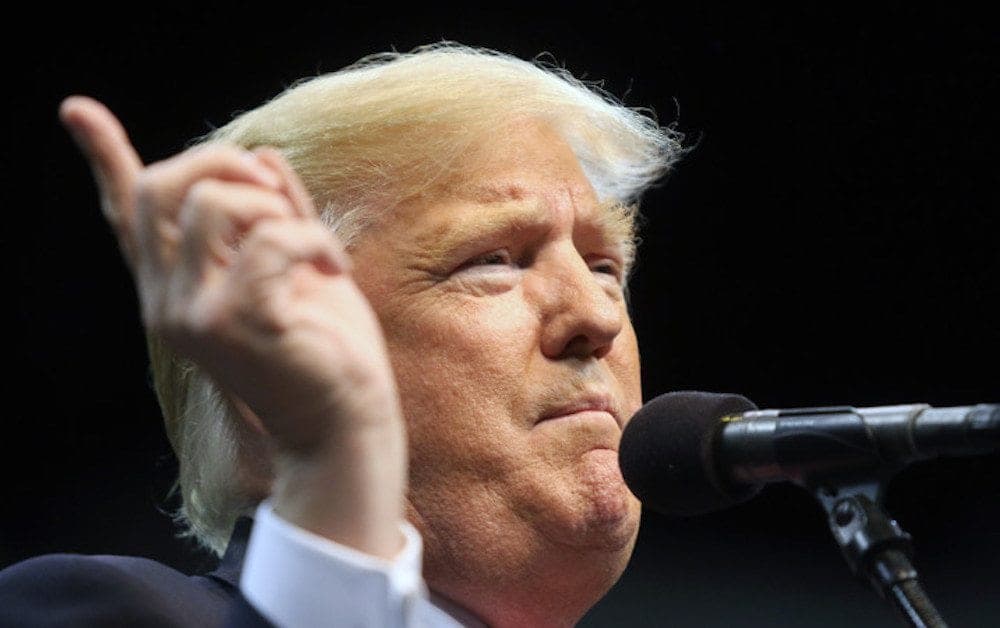Well, it’s happened.
Donald Trump is the presumptive Republican nominee for President of the United States, acknowledged as such by the Republican National Committee. After winning Indiana, it’s impossible to see how he does not get well beyond the 1237 delegates necessary for a first ballot victory at the Republican convention in Cleveland this summer. (This doesn’t even take into consideration many hundreds of unbound delegates likely to go his way.)
Even if his enemies somehow manage to out-maneuver Trump at the convention by changing the rules, a massive proportion of voters who currently identify as Republicans would leave the party and support what would likely be Trump’s run as an Independent.
Trump has the Republican leadership forked, and slowly realizing their party is coming apart at the seams.
But only in our lazy, binary political imagination is this automatically good news for Democrats — a party with their lowest legislative numbers since the Hoover administration, and only 30 percent of the electorate.
The fact that many Democrats are bolting their own party for Trump—and that Bernie Sanders will push for a contested convention—are the latest indications the Democratic coalition is also on its last legs.
The 2016 election cycle, as disruptive as it has been, has merely accelerated the disintegration of our outdated political categories and assumptions. Millions have already been looking around for a radically different way of imagining politics. Many millions more will be doing so now that Trump is more or less officially the Republican nominee.
The question at this point is what the new political realignment will look like.
As the coveted demographic of the future, millennials will have a disproportionate impact on where our political realignment ends up. Those still fighting the left/right wars of the 1970s are using an outdated model. The future belongs to a new generation which refuses to identify as Democrats or Republicans.
And this future is set up nicely to be America’s “Pope Francis moment.”
U.S. Catholics have known for some time that our moral theology and social teaching cannot be made to fit the liberal/conservative binary of the culture wars. But perhaps for the first time ever, our political culture now has an opening for someone like Pope Francis to be heard as a genuine alternative.
Here is a counter-culturally humble man who names himself first as a sinner. Here is someone who espouses and lives out a “magenta” ethic (neither red nor blue) which is at once deeply rooted in ancient traditions and principles, but also nimble enough to respond to the unique questions of our day.
It is no wonder Francis is so beloved by young people. Consider this:
- Like millennials, Pope Francis is centrally concerned with ecology and climate change.
- Like millennials (and especially Latinos), Pope Francis has a serious problem with abortion.
- Like millennials, Pope Francis puts welcoming immigrants and refugees ahead of border security and nationalism.
- Like millennials, Pope Francis believes in actually living out one’s values in attempting to bring about change, not simply relying on big, distant, and slow government institutions to do the work for you.
- Like millennials, Pope Francis has a special concern for the very high rates of unemployment among young people.
Perhaps most important of all is Pope Francis’ insistence on a culture of genuine encounter—a culture which speaks to millennials, who at once refuse to judge people using dismissible boxes or categories, but find themselves increasingly disconnected from genuine relationships.
Pope Francis’ popularity, however, goes well beyond young people. His visit to the US generated massive goodwill across the demographic, political, and theological spectrum.
He is perhaps the only public figure around who manages to take strong stances on the most controversial issues of our day while remaining genuinely beloved by young and old, rich and poor, conservative and liberal, men and women, secular and religious.
Perhaps it is providential that Pope Francis’ counter-cultural vision had the requisite time to seep into our public consciousness in advance of the most disruptive election cycle in nearly 60 years. With Pope Francis, we have been hit over the head with a genuine alternative—an alternative, it is worth noting, who has approval ratings a whopping 35 points higher than Donald Trump.
Oh yes, back to Trump. Has our political reality sunk in yet? A bloviating, pro-torture, misogynist billionaire with 35 percent approval ratings—who admits his campaign is merely a strategic show—is set to become the Republican party’s nominee for president.
Or, more precisely, he is about to become the nominee of the party formerly known as Republican.
Will you be one of the millions of Americans looking through the pieces of our disintegrating political culture for a radically different vision?
Boy, have I got a vision for you.
Charles C. Camosy of Associate Professor of Theological and Social Ethics at Fordham University.















